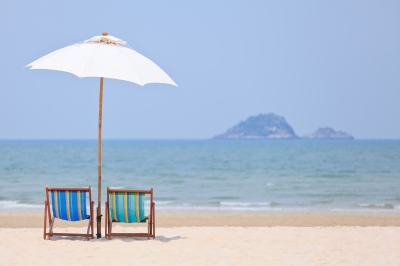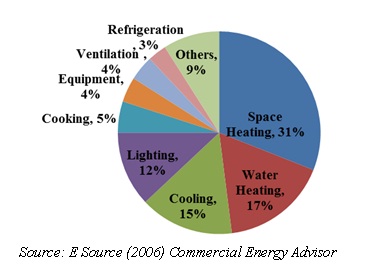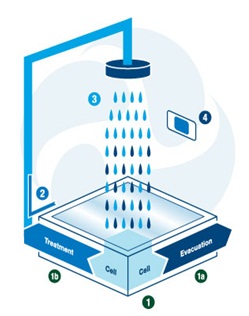- Articles ›
- Operations and IT ›
- Hotels Go Green via Smart Computing Articles
Hotels Go Green via Smart Computing
With the suffix “Green” and “Eco” becoming a cliché, customers across industries have developed a liking for products & services that claim to be eco-friendly. Parallel to this buzz, we see “Smart Computing” gaining momentum across all industries. Can the two much hyped concepts be entwined to bring phenomenal change in the Hotel Industry? Yes! In this article, we deep dive into how real time sensing can be leveraged to make hotels environment friendly.

Image Courtesy: Sura-Nualpradid, freedigitalphotos.net
Smart Computing is the integration of hardware, software & networking technologies that provide systems with the unique capability to perform real-time advanced analytics. This facilitates intelligent decision making on actions that can be taken in the real world to optimize resource utilization. In the name of luxury, hotels tend to consume more resources, than what is strictly needed. To set itself apart from this general norm, an Eco-Hotel can rely on real time sensor based monitoring.
Smart Energy Utilization

The chart shows the split up of energy consumption in a typical hotel. It is clear that majority of the energy is used for HVAC (Heating, Ventilation & Air Conditioning) System and for Lighting purposes. Reduction of Energy in these segments will have significant cost savings & will make the hotels eco-friendly. Some of the ways of conserving energy are as discussed below.
Smart – HVAC System
HVAC directly affects the wellbeing and satisfaction of guests and is of utmost importance. Therefore it is imperative to reduce energy consumption without compromising on comfort levels of the hotel residents.
Smart – Demand Controlled Ventilation
Fresh Air Ventilation Systems are required to ensure a continuous supply of clean air in the building. A good system pumps in outdoor air on an as needed basis. So, how should we determine outdoor air requirement? Ventilation is not solely based on occupancy. It is based on both occupants & building generated contaminants.
Occupancy sensors that identify the number of people in a room through image processing should be fitted in breathing zones, i.e. places occupied by people. Air sensors to quantify the levels of carbon dioxide and other contaminants should also be fitted to determine the need for outdoor air. Based on the observations by these sensors, the ventilation system controller should calculate the outdoor air requirement.
Such systems dynamically adjust the supply of air volume and are hence more efficient than static systems. Critical zones are continuously monitored to come out with accurate measurement of ventilation needs. Through such a demand based system, there is a significant reduction in energy usage while at the same time a healthy and conducive environment is maintained.
Smart – Air Conditioning and Heating
A centralized heating or cooling system is a common setup in large hotels. Such systems continuously condition the air in all the rooms regardless of it being occupied or not. This would result in unnecessary wastage of electricity. Motion sensors could be installed in rooms to reduce such wastage. The sensors sense if the room is occupied before activating heating/cooling. Motion sensors that identify the number of occupants in a room based on image processing can be used to vary the temperature. For example a conference room with a few 10s of people will need more air conditioning than a bedroom with around 4 occupants.
Smart – Lighting
Guests usually forget to behave sustainably when they stay at hotels. It is not so uncommon for them to leave their lights on when they leave the room. In large hotels, lighting accounts for up to 30% of the total energy consumption. A firm control on these systems will have a measurable impact on the hotel’s Profit & Loss Statement.
Installing motion based occupancy sensors in meeting rooms, restrooms and other low-traffic areas serve as efficient means to prevent lighting of rooms that are not in use. Some sensors can also capture the direction of motion of people through image processing; these could be used to light up lanes traversed by guests.
Daylight harvesting is the controlled admission of natural light into rooms, so as to reduce the consumption of electricity for lighting. Sensors can be used in dimming systems to adjust the intensity of lighting based on the available sunlight. The utilization of available sunlight can help save energy by at least 50% in hotels.
Finally in the case of outdoor lighting, hotels can make use of photo sensors for activation of street lamps based on daylight availability and use motion sensors in less used areas to prevent energy wastage.
Smart Renewable Energy Generation
Having talked about conserving energy, we shall now look at how Smart Generators can be used to generate electricity from renewable sources. It is well know that photovoltaic material converts solar energy to electricity. Likewise, piezoelectric material converts kinetic energy to electric energy. Such a material can be made use of to obtain electricity from rain or wind.
Now, what should the Smart Generator do? A climate sensor senses the weather condition. Based on the observation, the generator can switch to either the photovoltaic material or the piezoelectric material on a real time basis. This would be a boon to hotels located in areas where climatic conditions are unpredictable.
Smart Water Management
World War 3 could be a Water War and hence its conservation is of utmost importance. Smart Water Management, not only reduces the wastage of water but also significantly reduces energy usage by reducing the need to be continuously pumped backed into the system.
Smart Watering of Lawns
Large Hotels & Resorts pride themselves for the beautiful lawns that they maintain. United States Environmental Protection Agency’s partnership program “Water Sense” reports that as much as 50% of the water used for watering lawns and gardens is wasted due to run-offs, winds and irrigation. The reason for this being the inefficient watering methods and systems used. Lawns do not need to be watered every-day. The watering requirements vary based on regional climatic conditions, rains and daylight availability. So, how can hotels curb this water wastage?
Generally, in hotels sprinklers are turned on every day without considering if watering is really necessary or not. Suppose a soil sensor can be embedded in various location of the garden to monitor the water content of the soil and wirelessly transmit instructions to the sprinkler. When the water level falls below a certain point, the sprinkler automatically turns on and vice versa. Through the use of soil moisture based smart technologies; Eco-Hotels can reduce their water usage by over 15% annually.
Smart Showering
For some people, standing under a shower is a means of relaxation! When relaxing under a shower, a lot of clean water flows into the drain and mixes with dirty water and end up in the sewage.

Consider a smart shower that saves up to 80% water & electricity without limiting flow for a 20minute bath. It would have a shower base with water quality analysis cells/sensors. This could be simply built into the floor. The picture shows how the system actually works.
1. The cells on the base analyze the quality of the water
a. During the soaping phase, water is detected to be dirty and drained away. New water is used to supply to the showerhead
b. During the relaxation phase, water is detected as clean. This water is stored, filtered and immediately reused. Anti-bacterial treatment ensures that the water quality is maintained.
2. A small amount of hot water is pumped each time to ensure constant temperature for the water
3. Water sent through the showerhead is always clean
4. Controls can be provided to adjust the temperature and the flow rate of the water
EcoVéa from Reveeco is a type of smart shower technology that has a similar value proposition.
Future Outlook
Smart computing is the new generation of technology. It builds on top of existing technologies, the capability of real time situation awareness and automated analysis. A number of industries like manufacturing and energy have already seen sizable benefits by going smart. However some industries are apprehensive about the future of Smart Computing. Prior to the advent of “open-standards”, there existed the problem of sole-source lock. The buyer of smart computing equipment was locked to one particular vendor, who owned the proprietary rights for the technology, in a one-sided relationship. Today the scenario has changed. With common standards in place, it is financially feasible & viable to incorporate innovative solutions into the existing systems and grow continuously.
With environmental concerns pressurizing all spheres of business, hotels will have to proactively turn eco-friendly and sensor based environmental monitoring has a role to play in this shift. Eco-hotels will procure eco-aware devices in the market to gain the respect of customers and the confidence of environmentalists. Innovation is rapid in this arena and the market is fragmented. With open standards being the current trend, eco-hotels can incorporate third party products & technology into their existing solution. This increases the feasibility for eco-hotels to adapt to changing needs as they expand and go green
This article has been authored by Niveditya S from IIM Shillong
References
• “Energy Smart Tips for Hotels”, 2011, The Illinois Smart Energy Design Assistance Center
• “The Use of Smart Communicating Devices to Garner LEED Points”, 2010, LEED
• “Hotels: An Overview of Energy Use and Energy Efficient Opportunities”, Energy Star
• “Smart Computing Drives The New Era Of IT Growth”, 2009, Forrester
• Website: www.electronicsweekly.com “A Renewable Energy Generator for All Seasons”
• Website: www.reveeco.com
• Website: www.epa.gov/watersense/
• Website: nest.com
• Website: www.ebtron.com
• Website: YouTube Videos of Plant Link, OSO Technologies
Views expressed in the article are personal. The articles are for educational & academic purpose only, and have been uploaded by the MBA Skool Team.
If you are interested in writing articles for us, Submit Here
Share this Page on:
What is MBA Skool?About Us
MBA Skool is a Knowledge Resource for Management Students, Aspirants & Professionals.
Business Courses
Quizzes & Skills
Quizzes test your expertise in business and Skill tests evaluate your management traits
All Business Sections
Write for Us